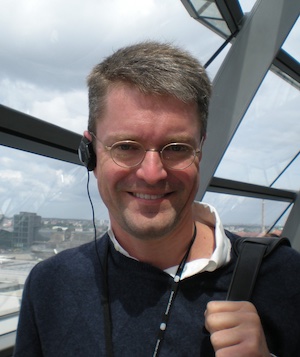By Will Zimmerman
For a political scientist, Mark Vail didn’t spend a lot of time in poli-sci classes as an undergraduate. It wasn’t that he was disinterested in those offered at the University of Texas at Austin’s Plan II Honors Program—the oldest liberal arts program of its kind in the world—but that he had lots of other interests, too.
“I was there to learn languages and literature and art and art history and philosophy,” said Vail, the Worrell Chair of Politics and International Affairs at Wake Forest University.
Tuition at Plan II was $945 a semester, and Vail exacted every penny’s worth. He opted for two semesters of chemistry instead of the basic science course plan, journeyed through multivariable calculus instead of math for poets, even squeezed a single political science course into the fold.
“I wanted to pull all of the marrow out of everything I learned,” said Vail. “I came out of [UT Austin] with a broad range of experiences across a number of disciplines. But, I wasn’t specifically trained to do anything. I was educated, but not trained.” His work at UT Austin also earned Vail membership in Phi Beta Kappa.
Following his graduation in 1993, Vail spent a year tending bar as he plotted his next move. He eventually decided to move to Medford, Massachusetts, and attend The Fletcher School of Law and Diplomacy at Tufts University. Vail said the choice was not driven by the allure of a distant destination or career, but by something simpler: “a love of European history and culture and languages.”
After earning a two-year degree from Fletcher in European politics and law, Vail followed his passion across the country to the University of California at Berkeley. In 1998 he completed his M.A. in political science. By 2005, he’d earned his Ph.D.
While at Berkeley, Vail felt like something of an outlier because he was older than many of his peers. Other students had sped through their undergraduate years in pursuit of the shortest path to a political science Ph.D. program. Many were fresh out of college.
By contrast, Vail said his path was “broad and slow.” That’s not a regret, though—it was that broad and slow approach that taught him to appreciate both the product and the process.
“Ph.D. programs can be grueling,” Vail said, “but if they’re done well, they teach you to really love the subject matter—not just to master it, but to love it. That’s something that I think I would not have been able to acquire without my educational background.”
Loving the subject matter is continuing to develop language skills—French and German—first broached at Plan II and now matured to proficiency, as Vail said, so that he “can inhabit and experience” the areas of Europe that he studies professionally.
Loving the subject matter is attending a concert at the Berlin Philharmonic, “arguably the greatest symphony in the world,” Vail said, and understanding the melodic rises and falls of Brahms Violin Concerto as “a piece of music and a piece of history—an expression of the long and deep vein, bringing to light the best that a great but troubled country has to offer.”
Loving the subject matter is running fingers along the stately buildings of Berlin’s museum island, feeling the pain and suffering of millions of people in the form of 50-caliber pockmarks—remnants from fierce battles at the end of World War II, the purest “encapsulations of the tensions and contradictions in German history,” Vail observed.
Loving the subject matter is teaching political science to the next generation, not with the firmness to produce a batch of seasoned American scholars, but with the intention to instill within them the same “love for the materials and the histories and the places” that have informed a full and appreciative life, Vail said.
First as a professor at Tulane University and now at Wake Forest University, Vail has made it his mission to present students with the same wherewithal he gleaned as a student at Plan II.
“Students will sometimes ask me, ‘What do you want us to learn in your class?’” Vail said. “I don’t know yet!”
“The Latin root of ‘education’ means to draw out,” Vail continued. “My job is to expose you to different kinds of ideas and perspectives. To introduce you to the process of intellectual self-discovery in a way that you might not [come to] on your own. To teach you to look at the world in a new way.”
With the towering glass-plated business school glistening across the quad, Vail knows that it’s not always easy to assure students that there’s merit to this—to educating rather than training. And yet, during lectures, within office hours, and over coffees, he purports his truth: that a looser and more enigmatic approach to his class and to the educational experience as a whole are acceptable, even beneficial, towards both a successful career and a fulfilling life.
Vail credits his liberal arts background for the coalescing of the two, hearkening back to the Berlin philharmonic, to an experience “that you can’t engineer and you can’t prescribe,” he said.
“To be receptive to enough different ways of looking at the world so that I can appreciate it all on its own terms—my education and my involvement with Phi Beta Kappa taught me to cherish that.”
Will Zimmerman graduated from Wake Forest University in May 2023 with an interdisciplinary degree in journalism, film, and creative writing. He was inducted into the Delta of North Carolina chapter several weeks before his graduation.




